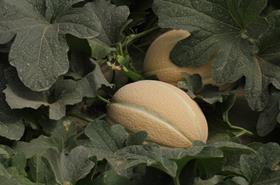
Israel has been a hotbed of melon varietal development for many years. Starting with the Ogen varieties, variations of the Ananas type were developed. The Galia, meanwhile, was started in the 1980s and is still dominant to this day. Today, some of the major seed companies in Israel still breed melons, looking for incremental improvements.
Origene Seeds develops a range of melon segments – Galia, Ananas, Cantaloupe, Yellow Canary, Charantais and Honeydew – improving in-bred resistance as diseases re-create themselves. Hazera continues to work mainly with Galia types, looking at earlier maturity and long shelf-life, as well as some focus on fruit for processing and fresh-cut with different flesh colours.
Genesis Seeds focuses purely on Galia types, aiming at higher yields, high brix and longer shelf-life without loss of flavour. Two Genesis varieties are commercially successful: Suzan, which is grown in Israel for export, as well as in Spain and Brazil with Dona, a larger fruit grown mainly for the local Israeli market.
Today, all breeding units incorporate resistance to fusarium, powdery mildew and necrotic spot virus as a basic need. It is in the area of exotic-type melons that interesting developments are ongoing.
The MelOnArt project is an unusual pre-breeding programme initiated by Professor Perl-Treves, a cucurbit geneticist from Bar-Ilan University. While professional melon breeders utilise only a small part of the existing variation in fruit size, taste, colour and shape, since they are committed to the prevailing marketing types, MelOnArt starts from exotic germplasm and develops novel fruit types. A collection of prototypes has been derived and stabilised by crossing exotic genotypes from different geographic origins with known horticultural types such as Charentais, Western Shipper and F1 Spanish types. They have been tested in greenhouses and field plots, and the more advanced ones have been registered. The traits that define these new fruit types include sweetness, aroma, interesting skin patterns such as coloured stripes and streaks, with emphasis on small fruit size – ranging from “plum-size” via “apple/ mandarin size”, to “orange-size”. Juicy as well as crunchy textures were selected, with refreshing and unusual results.
Another breeding programme with a difference is conducted at Catom Seeds, based at Ein Tamar near the Dead Sea. The name Catom is Hebrew for ‘orange’ so the focus is on orange-fleshed varieties. The developed melons have been introduced commercially as the Pearlina line, unique in their external pearl colour. Catom has also developed Piel de Sapo melons which are already selling commercially. Work is equally being done to develop sweet and sour melons.



